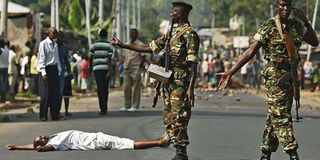Burundi president Nkurunziza sacks key ministers after coup bid

A man lies on the ground in protest during a demonstration in the Musaga neighbourhood of Bujumbura on May 18, 2015. AFP PHOTO | CARL DE SOUZA
What you need to know:
- Nkurunziza named Emmanuel Ntahonvukiye, a civilian, as his new defence minister, and Alain Aime Nyamitwe as foreign minister, as well as replacing the trade minister.
- The president has been accused of intimidating opponents and failing to lift the fortunes of small landlocked Burundi, one of the poorest countries on the planet.
- There are fears Burundi could slide into a cycle of vicious reprisals against anyone linked to the coup, after witnesses and security sources said troops loyal to the president have been hunting down rival soldiers, even the wounded in hospital.
Burundi's president sacked his defence and foreign minister on Monday after a failed coup bid, as hundreds of protesters defied warnings to end demonstrations and resumed weeks of anti-government street marches.
Protesters opposed to President Pierre Nkurunziza's bid for a third term in power gathered in several parts of the capital Bujumbura, singing songs and blowing whistles, each time chased away by soldiers shooting in the air, then regrouping elsewhere.
"It was courageous to protest today after all the threats that demonstrators have received from the authorities... and the presence of many heavily armed soldiers, who have not stopped firing live rounds -- but fortunately into the air and not at demonstrators," said Pacifique Nininahazwe, a protest leader.
Mr Nkurunziza meanwhile named Emmanuel Ntahonvukiye, a civilian, as his new defence minister, and Alain Aime Nyamitwe as foreign minister, as well as replacing the trade minister.
Tensions also surfaced within the army as well as in government.
Five days on since the coup attempt led by a top general -- which saw soldiers battling each other on the streets -- troops have largely replaced the police to stem the protests.
'WE ARE FIRING BULLETS'
One soldier shouted at protesters to "leave the streets", warning that they were not just going to fire water cannon, but guns. "We are firing water, we are firing bullets," he shouted.
Before the coup attempt the army was seen by many protesters as being more neutral than the police -- often standing between demonstrators and the police -- and some soldiers were unhappy at the force's role.
"We are not there to shoot people," one said.
At least 20 people died in several weeks of street battles with security forces before the demonstrations ended when generals launched a failed coup attempt last week.
Nininahazwe called for a "peaceful march," saying that protesters had "conquered fear" and that the numbers would grow in size in coming days.
When the army fired shots into the air, protesters reacted by lying down on the ground, raising their hands in the air and singing the national anthem.
FEAR OF REPRISALS
Bujumbura mayor Juma Saidi, speaking on state television on Sunday, warned that "demonstrators will be considered as part of the coup, and security forces have been ordered to treat them as such".
US State Department spokesman Jeff Rathke expressed concern over the situation on Monday, saying "peaceful protesters should not be equated with people who participated in an attempted seizure of power."
A 12-nation regional bloc, the International Conference on the Great Lakes Region, meanwhile said it would send a delegation of heads of state and government to Burundi as soon as possible to help resolve the crisis and allow for the return of those who have fled the country.
More than 100,000 people have fled to neighbouring nations since political violence that culminated in last week's foiled coup attempt erupted in April, according to the UN.
Meeting at a summit in Angola, the regional bloc said the delegation would include members from South Africa, Kenya, Uganda and Tanzania, Angolan news agency Angop reported. South Africa has an observer status with the organisation.
Nkurunziza has been accused of launching a campaign of repression against opponents and trying to silence independent media since coup leaders admitted defeat on Friday after fierce fighting with loyalist troops.
Opposition and rights groups insist that Nkurunziza's bid for a third five-year term is against the constitution and the terms of the peace deal that brought an end to the country's civil war in 2006.
The president has also been accused of intimidating opponents and failing to lift the fortunes of small landlocked Burundi, one of the poorest countries on the planet.
Nkurunziza, a former rebel leader and born-again Christian who believes he has divine backing to lead the country, argues his first term did not count as he was elected by parliament, not directly by the people.
There are fears Burundi could slide into a cycle of vicious reprisals against anyone linked to the coup, after witnesses and security sources said troops loyal to the president have been hunting down rival soldiers, even the wounded in hospital.
"We are afraid, we wait at home without knowing what will happen," said one resident, fearing attacks by the Imbonerakure, the youth wing of the ruling party.
"If they want to kill us, who will talk about that?" he added, pointing out that key independent radio stations were closed.




